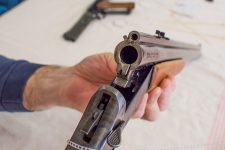Firearms Control Laws: Has Australia Got It Right?

Australia and the United States share many similarities – but one of the most striking differences is their respective approaches to gun ownership.
Australia has gained recognition for its progressive approach to gun violence following the horrific Port Arthur massacre in 1996, which led to a public ‘buy back’ of weapons and the introduction of strict gun ownership laws.
By contrast, gun ownership in the United States is viewed as a constitutional right, with the Second Amendment protecting the right to own and bear arms. The nation is plagued by high rates of gun crime – in 2015 alone, there were 372 mass shootings which left 475 people dead and a further 1,870 injured.
In response, President Barack Obama has vowed to ramp up gun control measures. During his first address of 2016, Obama proposed to implement a number of federal measures to combat gun crime, including:
- Federal background checks on those wishing to purchase guns,
- Federal licences for businesses which sell firearms, and
- Increased funding for police to enforce gun laws.
Unsurprisingly, Obama’s proposals have sparked a heated debate between gun enthusiasts and those who support tougher gun controls.
Supporting Access to Guns
The National Rifle Association (NRA) is the largest pro-gun lobby group in the United States.
It argues that the right to bear arms is both a constitutional and civil right; and that individuals should have easy access to guns in order to defend themselves and their property in the face of a threat.
It points out that “guns don’t kill people, people kill people” and suggests that in the hands of responsible, law-abiding individuals, guns pose little threat to society, and can even reduce crime by deterring would-be criminals.
It also suggests that the right to bear arms can be a deterrent against police shootings, although statistics suggest otherwise; with over 1000 people being shot dead by US police each year.
Supporting Reduced Access
Those who support tougher gun control typically argue that a proliferation of guns in the community leads to an increased likelihood of gun crimes; whether by those who legally possess weapons, or by making it easier for those intent on committing crimes to acquire guns illegally through theft or other unlawful means.
They point to the sky-high rates of gun crime in the US, to the fact that many domestic violence murders and other killings occur using legally obtained weapons, and to the fact that guns make it very easy to kill.
In relation to domestic violence, advocacy group Everytown for Gun Safety states:
“Domestic violence in America is to a significant degree a problem of gun violence. Over the past 25 years, more intimate partner homicides in the U.S. have been committed with guns than all other weapons combined.”
In relation to mass shootings, a 2015 investigative report by the New York Times titled ‘How They Got Their Guns‘ found that:
“The vast majority of guns used in 15 recent mass shootings, including at least two of the guns used in the San Bernardino attack, were bought legally and with a federal background check.”
Gun control groups argue that the accessibility of guns in homes throughout the US increases the likelihood of anger leading to murder – whether in the domestic or public context – and that it is absurd to argue that more guns does not lead to more gun crime.
Statistics
US statistics show that:
- There are, on average, 89 firearms per every 100 Americans – meaning that the United States has the highest rate of private gun ownership in the world, and
- There are 29.7 homicides per 1 million people involving firearms each year, which equates to 11,385 deaths from gun-related crime each year.
By comparison, Australian statistics show that there are only around 1.4 homicides per 1 million people involving firearms each year.
Mass Shootings
Besides these statistics, supporters of tighter gun control point to the many heartwrenching stories which illustrate the destruction posed by easy access to guns:
- The Columbine massacre, in which 12 students and one teacher were killed,
- The Virginia Tech shooting, which left 32 dead, and
- The Sandy Hook Elementary School shooting in 2012, in which 20 young children and six teachers were killed.
These are just a few of the tragic mass shootings which occur in the United States at an average of more than one per day.
That is to say nothing about the thousands of gun-related homicides which occur each year – as well as tragic accidents due to firearm misuse; often by children who are playing unsupervised with a family member’s weapon.
According to government statistics, an average of 62 children died each year between 2007 and 2011 due to accidental shootings.
Australia’s Approach
Americans have looked to Australia for guidance on how to strengthen gun laws.
Back in 1988, there were an average of 674 gun-related deaths in Australia each year – but since the government buy back of firearms in 1996 and the introduction of tougher laws, the number of fatal shootings has dropped to just 207 in 2013. While this is a huge fall, it should be pointed out that violent crime rates have been dropping in all categories over the past 20 years or so – which means that tougher gun laws cannot take the full credit.
Of course, 207 fatal shootings is still far too many – but it represents just a small fraction of the thousands shot dead in the United States each year.
Some believe that Australia has struck a fair balance when it comes to gun control: while we do not entirely prohibit the individual ownership or use of firearms, we impose stringent regulations in order to reduce the likelihood of guns being used to harm.
Those who wish to own firearms must obtain the relevant firearm licence, and there are strict penalties for breaking the many rules and regulations that come with owning a weapon.
On top of this, a national firearms registry attempts to track firearms around the country, although critics correctly highlight the fact that a registry can never track illegal firearms.






